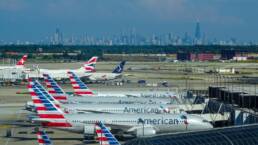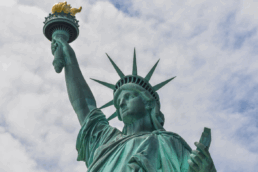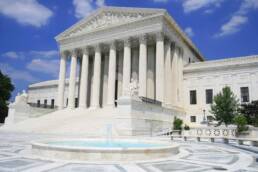The U.S. continues to limit travel into the U.S. due to the on-going COVID-19 pandemic. As many are aware, India is experiencing the world’s worst Covid-19 outbreak. The country is facing a new wave of COVID-19 due to the widespread, on-going transmission of SARS-CoV-2, the virus that causes COVID-19, and now accounts for over one-third of new global cases. With the magnitude and scope of the COVID-19 pandemic in India surging, President Biden recently added India to the list of countries on the U.S. government’s so-called “red list” for travel. The red list is comprised of countries subject to Trump-era COVID-19 travel restrictions, which were reimposed by President Biden on January 25, 2021 through Proclamation on the Suspension of Entry as Immigrants and Non-Immigrants of Certain Additional Persons Who Pose a Risk of Transmitting Coronavirus Disease.
The COVID-19 travel restrictions were imposed to prevent the further spread of the coronavirus disease and prohibit the entry of foreign nationals into the U.S. if they have been physically present in one of the restricted countries 14-days prior to their attempted entry into the U.S., with some exceptions. One exception to the COVID-19 travel restrictions is for “national interest” travel, known as the National Interest Exception (NIE). On April 26, 2021, U.S. Department of State (DOS) issued new guidance, expanding NIE eligibilities to all countries now subject to the COVID-19 travel restrictions.
Which countries are subject to the COVID-19 travel restrictions?
- The 26 countries of the Schengen area;
- United Kingdom of Great Britain and Northern Ireland;
- Ireland;
- Brazil;
- China;
- Iran;
- South Africa; and
- India.
Who is exempt from the travel restrictions?
The COVID-19 travel restrictions imposed in Biden’s January 25, 2021 Proclamation do not apply to the following individuals:
- Lawful permanent residents of the U.S.;
- Any noncitizen national of the U.S.;
- Any noncitizen spouse of a U.S. citizen or lawful permanent resident;
- Any noncitizen who is the parent or legal guardian of a U.S. citizen or lawful permanent resident (if child is unmarried and under the age of 21);
- Any noncitizen who is the sibling of a U.S. citizen or lawful permanent resident, provided that both are unmarried and under the age of 21;
- Any noncitizen who is the child, foster child, or ward of a U.S. citizen or lawful permanent resident;
- Noncitizens traveling for a purpose related to containment or mitigation of the virus;
- Air or sea crewmembers;
- Noncitizens seeking entry into the U.S. under the following categories: A-1, A-2, C-2, C-3 (as a foreign government official or immediate family member of an official), E-1 (as an employee of TECRO or TECO or the employee’s immediate family members), G-1, G-2, G-3, G-4, NATO-1 through NATO-4, or NATO-6.
- Any noncitizen whose travel falls within the scope of section 11 of the United Nations Headquarters Agreement;
- Any noncitizen who is a member of the U.S. Armed Forces as well as their spouse and children;
- Any noncitizen whose entry would further important U.S. law enforcement objectives; or
- Any noncitizen whose entry would be in the national interest.*
Who can qualify for a NIE?
In general, the following foreign nationals may qualify for a NIE:
- Holders of a valid U.S. visa
- Holders of a valid ESTA travel authorization
- Applicants for a new U.S. visa
What qualifies as “national interest” travel?
Eligible foreign nationals may qualify for a NIE if they seek entry into the U.S. based on the following:
- Individuals whose entry serves the “vital support of critical infrastructure sectors as defined by the DOS or critical infrastructure linked supply chain”;
- Note: NIE applicants must provide evidence that their entry into the U.S. is systemically relevant and that they provide a significant contribution to one of 16 critical infrastructure sectors or related supply chains.
- Critical infrastructures include: Chemical; Communications; Dams; Emergency Services; Financial; Government Facilities; Information Technology; Transportation Systems; Commercial Facilities; Critical Manufacturing; Defense Industrial Base; Energy; Food and Agriculture; Healthcare and Public Health; Nuclear Reactors, Materials, and Waste; and Water.
- Health professionals working on COVID-19 containment/persons working in the health care sector;
- Humanitarian travel;
- U.S. national security purposes;
- Harvest workers;
- Service providers for U.S. authorities (i.e., the military);
- Pilots/aircrew members;
- Certain exchange visitors (J-1); and
- Students (F-1, M-1, J-1);
- Continuing F-1 students: NIE automatically applies.
- New F-1 students: NIE automatically granted as part of the visa approval process.
- All J-1 students and scholars (new and continuing): NIE not automatic, must be requested.
- Immigrant or Fiancé visa applicants; and
- Journalists.
NIE Applicants are responsible for proving their entry into the U.S. is a matter of national interest to be exempt from the COVID-19 travel restrictions. DOS and the U.S. Department of Homeland Security (DOS) have the ultimate say in who qualifies under these exemption categories.
As India is now included in the “red list” of countries subject to the COVID-19 travel restrictions (addition effective May 4, 2021), foreign nationals who have been physically present in India within 14 days of travel to the U.S. will be barred from entry, unless they qualify for an exception such as the NIE. NIE Applicants in India should be aware that U.S. consular operations in India are significantly reduced due to the COVID pandemic and individuals are likely to have difficulty obtaining appointments unless emergency circumstances exist. It is likely the U.S. will be more scrupulous in permitting national interest travel in countries, such as India, where transmission is severe.
Our team here at Berardi Immigration Law continue to closely monitor the implementation of COVID-19 travel restrictions and will keep an eye for more important updates.
Additional Assistance
Berardi Immigration Law helps individuals obtain NIEs and provides an individualized approach for each client. If you are a foreign national seeking a NIE, please contact our office to schedule a consultation with one of our attorneys today!
Ready to have Berardi on your side?
Whether you’re a business looking to hire or a professional hoping to relocate, immigration law can be complicated. But you don’t have to do it alone. Put our experience to work for you.



